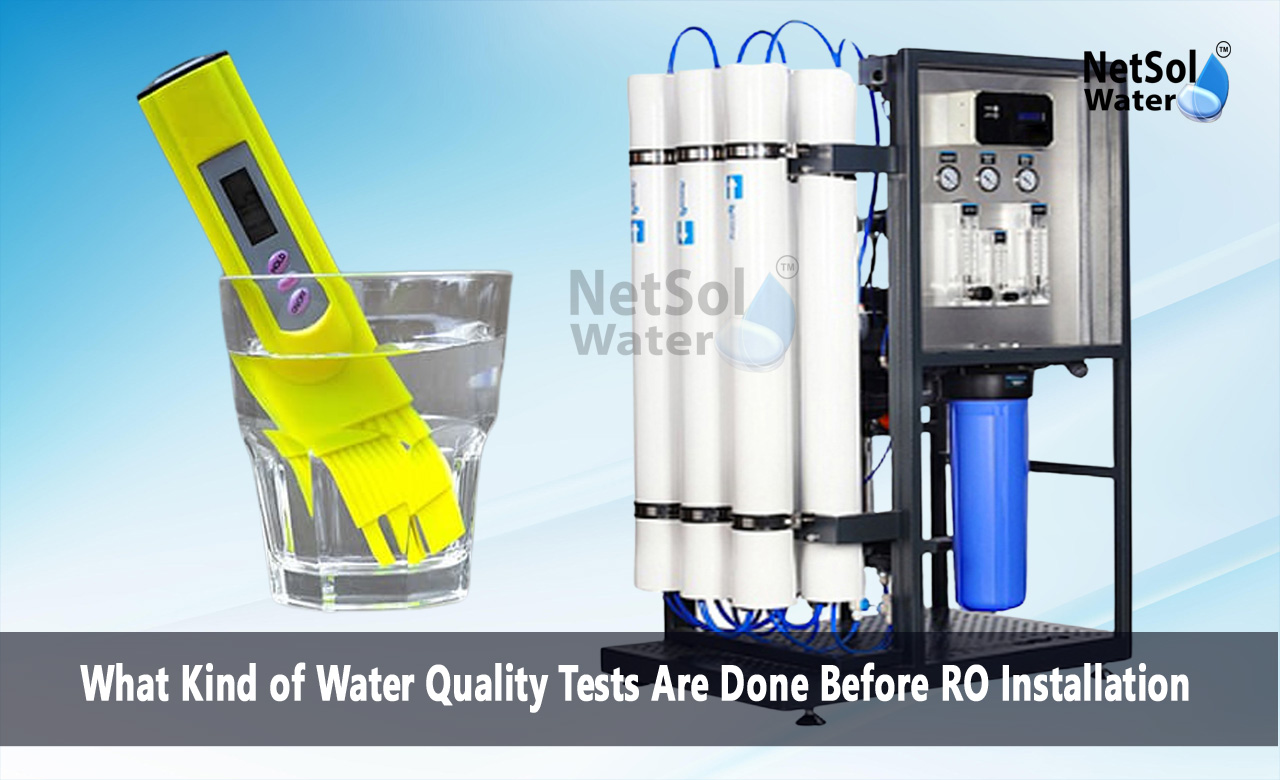What Kind of Water Quality Tests Are Done Before RO Installation?
Ensuring clean and safe drinking water starts with proper testing. Water quality tests done before RO installation guide experts in choosing the right system design. They also help prevent damage to filters and membranes. Homeowners and businesses gain confidence when they know the water meets key criteria. Netsol Water uses a clear process to assess water. This process checks for minerals, particles, acidity, and harmful organisms. It also screens for chemical traces that may harm health. By carrying out these steps Netsol Water tailors each RO plant to local needs. Such care leads to long lasting performance and pure water at every tap.
Total Dissolved Solids Measurement
Water brings minerals and salts in a dissolved state. High levels of these solids can reduce RO efficiency. Netsol Water tests total dissolved solids to plan the right membrane type. Let us have a look at some methods to measure TDS
Digital TDS Meter: Technicians insert a hand held meter into a water sample. The device displays a numeric value. This value shows how many milligrams of solids sit in each litre of water. Experts record this reading to set system pressure and flow rate.
Gravimetric Analysis: Laboratory staff filter and dry a known volume of water. They weigh the residue that remains on the filter. The weight reflects the total solids content. This method offers more precise data for complex water sources.
pH Level Assessment
The acidity or alkalinity of water affects RO membranes. A balanced pH protects the membrane from early wear. Netsol Water measures pH to ensure system longevity. Let us have a look at some approaches to test pH
pH Test Strips: These strips change colour when dipped into water. A colour chart helps match the shade to a pH number. This quick method guides field technicians on the spot.
Portable pH Meter: Experts use a calibrated electronic meter for finer readings. They immerse the probe and note the exact value. This tool helps adjust feed water treatment if the pH lies outside the safe range.
Hardness Analysis
Hard water contains high levels of calcium and magnesium. These minerals scale on RO membranes and pipes. Netsol Water tests hardness to decide if a softening step is needed. Let us have a look at some ways to check hardness
Titration Method: Technicians add a reagent to a measured water sample. They watch for a colour shift to signal end endpoint. The amount of reagent used reveals the hardness level in grains per gallon.
Hardness Test Kits: These kits include capsules or drops that react with the water. A color match shows the hardness range. This tool gives a rapid view of mineral levels before RO installation.
Turbidity Check
Cloudy water carries suspended particles that foul membranes. Turbidity tests show how clear the water runs. Netsol Water evaluates turbidity to protect filters and improve water taste. Let us have a look at some tests for turbidity
Nephelometric Turbidity Unit Measurement
A lab instrument shines light through a water sample. A sensor reads the scattered light. The result in NTU tells how many particles float in the water.
Simple Visual Assessment: Staff pour water into a clear cylinder. They hold it against a white background. They note if particles cloud the view. This step helps decide if pre filtration is needed.
Microbial Test
Bacteria and viruses pose health risks in drinking water. RO plants block most microbes but testing ensures safe input. Netsol Water carries out microbial tests before any installation. Let us have a look at some common microbial tests
Total Coliform Count: Experts feed a water sample into a growth medium. After a set time they count colonies that form. This count signals possible contamination.
Heterotrophic Plate Count: Technicians spread water on a nutrient plate. They incubate it to grow general bacteria. The colony count reveals overall microbial load.
Chemical Contaminant Screening
Various chemicals and metals can hide in water. Some of these pose long term health risks. Netsol Water screens for such elements to shape the RO pre treatment. Let us have a look at some screening methods
Heavy Metal Analysis: Laboratories use spectrometry to detect metals like lead and arsenic. This precise test finds even minute traces. Results guide experts to add special filters if needed.
Organic Compound Testing: This test seeks pesticides or solvents. It uses gas chromatography in a lab. Identifying these compounds helps protect users from unseen hazards.
Conclusion
Netsol Water leads the way in ensuring clean water with thorough water quality tests done before RO installation. Each measure from TDS checks to microbial tests ensures that the system fits local water needs. You can trust Netsol Water to deliver pure water and reliable performance. Reach out today for more information or to request a consultation tailored to your site.
Contact Netsol Water at:
Phone: +91-9650608473, Email: enquiry@netsolwater.com



